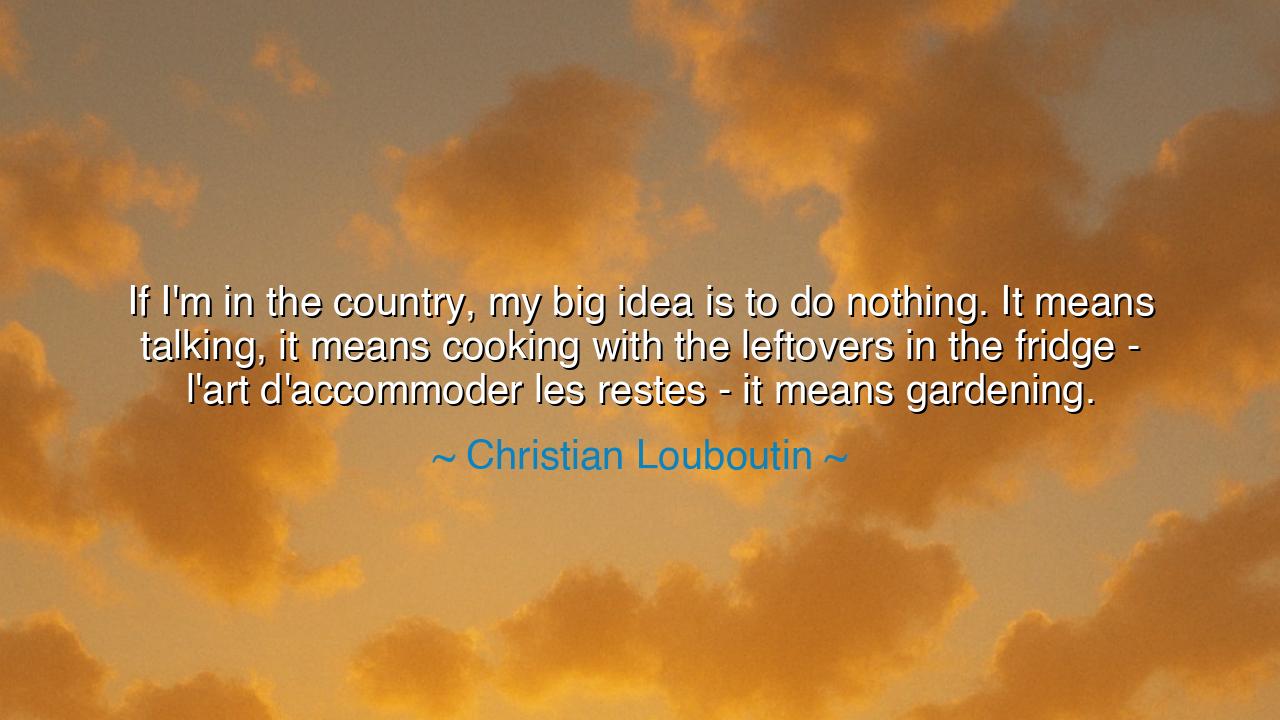
If I'm in the country, my big idea is to do nothing. It means
If I'm in the country, my big idea is to do nothing. It means talking, it means cooking with the leftovers in the fridge - l'art d'accommoder les restes - it means gardening.






Hear, O children of wisdom, the profound words of Christian Louboutin, who speaks of the sacred art of rest, reflection, and simplicity: "If I'm in the country, my big idea is to do nothing. It means talking, it means cooking with the leftovers in the fridge - l'art d'accommoder les restes - it means gardening." In these words, Louboutin reveals a deep truth—that the art of doing nothing is not idleness, but a form of rejuvenation and connection with life. In the simplicity of conversation, cooking with leftovers, and tending the garden, there is a profound wisdom and fulfillment. These acts are not trivial, but sacred, for they remind us of the power of presence and the value of simplicity.
In the ancient wisdom of the Greeks, Aristotle spoke of eudaimonia, or flourishing—the idea that true happiness is not found in endless striving or accumulation, but in living a life of virtue and moderation. This philosophy called for moments of stillness, reflection, and engagement with the simple pleasures of life. Similarly, in the Taoist tradition, Laozi taught that to live in harmony with the Tao is to follow the path of simplicity and peace, avoiding the excesses and noise of the world. Louboutin’s words reflect this timeless principle—that doing nothing is not an escape from life, but a way to reconnect with its essential rhythms. To engage in the simple arts of conversation, cooking, and gardening is to return to a more authentic and grounded existence.
Consider, O children, the example of the great philosopher Socrates, who, though constantly engaged in the pursuit of wisdom, often enjoyed simple moments of connection with his friends. Socrates believed that philosophy was not a solitary pursuit but was deeply intertwined with daily life. In the warmth of conversation, in the exchange of ideas, in the shared simplicity of life, Socrates found the essence of true knowledge. Louboutin's appreciation of doing nothing echoes this ancient understanding: that true richness is not found in material accumulation, but in the depth of our relationships and in the simple, nurturing acts of life.
In ancient China, the art of gardening was not just about cultivating plants, but about cultivating the mind and the spirit. Confucius taught that the care of the garden was akin to the care of the self—tending to what is small and simple allows the mind to rest and find clarity. Gardening, in this light, is not a passive act, but an active engagement with the world that teaches patience, attentiveness, and humility. Louboutin’s love for gardening, as part of his idea of doing nothing, mirrors this ancient wisdom. To plant, nurture, and witness the growth of life in the soil is to participate in the eternal cycle of nature, finding peace in the smallest actions.
There is also wisdom in l'art d'accommoder les restes, the art of using leftovers, as Louboutin calls it. In many ancient cultures, frugality and resourcefulness were seen as virtues, not out of necessity, but as a way to live with intention and mindfulness. In the Middle Ages, cooks and housewives were revered for their ability to create meals from scarcity, turning humble leftovers into nourishing, satisfying dishes. This practice was not about deprivation, but about appreciating what is given, using what is available to create something new and beautiful. It is a lesson in gratitude and creativity, reminding us that even in simplicity, there is abundance.
The lesson here, O children, is that there is wisdom in slowing down, in engaging with the simple pleasures of life that restore our spirit. When we feel the pull of modernity’s constant rush, we must remember that doing nothing, as Louboutin suggests, does not mean escaping life, but rather fully embracing it. Time spent in conversation, in cooking with what we already have, or in the gentle act of gardening, is not time wasted, but time well spent—time that nourishes the soul and aligns us with the rhythms of nature.
What must we do with this wisdom, O children of the divine? Let us create space in our lives for slowness—for conversation, for reflection, for simple acts of creation. Whether we are cooking with leftovers, tending our gardens, or simply being present with those we love, let us remember that these simple acts are as nourishing for the soul as the most grandiose achievements. In doing so, we find a deep connection to the world around us and to ourselves, and in the stillness of these moments, we find the true richness of life.






AAdministratorAdministrator
Welcome, honored guests. Please leave a comment, we will respond soon